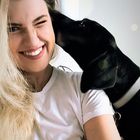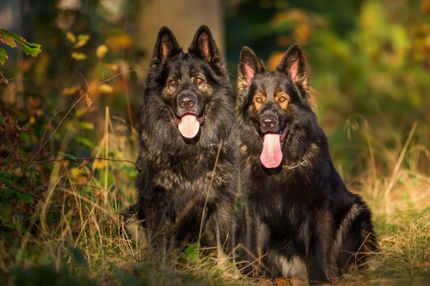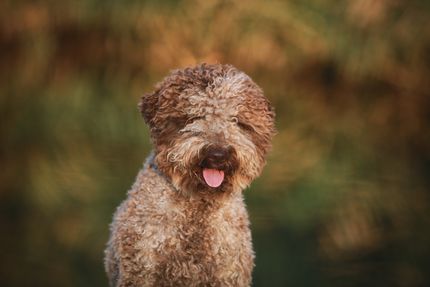Facts & Origin
What is a Labmaraner?
The Labmaraner, also known as a Labrador-Weimaraner mix or hybrid of Labrador Retriever and Weimaraner, is one of the so-called designer dogs - i.e. mixed breeds that are specifically bred to combine certain characteristics. This cross between two active hunting dogs often produces sporty, intelligent and people-oriented dogs. Although the term Labmaraner is becoming increasingly common among dog lovers, it is not an officially recognized breed, but a modern hybrid breed that is often referred to as a Weimaraner-Labrador mix or simply a mixed breed dog with hunting dog genetics.
Criticism of hybrid breeds
The targeted breeding of hybrid breeds such as the Labmaraner is not without controversy. Critics point out that many matings are based on visual trends rather than health or behavioral criteria. In contrast to recognized breeds, many designer dogs lack a long-term, controlled breeding line that ensures consistent character and health development. In addition, it is often suggested that hybrid breeds are more robust or allergy-friendly - which is not scientifically proven.
Another problem: unpredictable characteristics. While some Labmaraners turn out to be balanced family dogs, others can show significantly more hunting instinct, insecurity or independence - depending on which genetic characteristics predominate. Anyone choosing a Labmaraner should be aware of these uncertainties and not assume that they will automatically get the "best of both breeds".



| Alternate Name | Weimador, Labrador-Weimaraner mix |
| Origin | UK - Germany |
| Life expectancy | 10 - 14 years |
| Care requirements | low-maintenance |
| Activity level | average - high |
| FCI group | not recognised |
| AKC group | not recognised |
| KC group | not recognised |
More Labrador Retriever mixes
More Weimaraner mixes
Attitude, character and temperament of the breed
Possible character traits
A well-socialized and responsibly bred Labmaraner can be an extremely loving, eager to learn and active companion. Many representatives of this crossbreed show a close bond with their caregiver, are playful, alert and at the same time very people-oriented.
At the same time, depending on their genetic make-up, challenging character traits can also occur - such as a pronounced hunting instinct (from the Weimaraner) or a strong fixation on food (from the Labrador). A certain stubbornness or sensitivity is also not uncommon. The Labmaraner therefore needs
Clear rules and loving consistency
Consistent training from puppyhood onwards
Sufficient mental and physical exercise, as both original breeds are very active and eager to work
It is particularly suitable for active families, sporty owners or people with experience who enjoy spending time with their dog.
Character
Care and health - what you should know
The Labmaraner is usually uncomplicated to groom, provided it has inherited a short coat. Regular brushing is sufficient to remove loose hair - especially during the shedding season, when Labrador mixes often shed a lot. As with both parent breeds, the ears should be checked and cleaned regularly to prevent inflammation.
In terms of health, typical hereditary diseases of both breeds can occur in Labradors, including
Hip dysplasia (HD)
Elbow dysplasia (ED)
Progressive retinal atrophy (PRA)
Epilepsy
Gastric torsion (especially in larger, deep-breasted representatives)
When breeding, it is important that both parents are examined and approved by a vet. Unfortunately, "hobby breeders" often breed without any prior health checks - which increases the risk of later diseases. Good advice, transparent health certificates and a critical look at the origin of the puppy are therefore essential.


Possible appearances
As the Labmaraner is a mixture of two very different breeds, its appearance can vary greatly. Some specimens look very similar to the Weimaraner - with a slender build, long legs and silver-grey coat, while others have the more compact, stronger build of the Labrador. The coat color also varies between:
Silver, gray, beige (Weimaraner type)
Brown, black or blond (Labrador type)
Sometimes mixed forms or gentle transitions - e.g. silver-brown or mouse-grey with shading
The eye color ranges from amber to dark brown, rarely with a slight green tint. The coat is usually short, smooth and easy to care for, but can also be somewhat thicker or velvety depending on the line.
| Fur length | short |
| Fur | flat coated - |
| Ear shape | Triangle - Floppy Ear |
| Tail | lang |
| Anatomy | rugged, massive, slim, sporty |
| Size ♀ | 55 - 67 cm |
| Weight ♀ | 20 - 32 kg |
| Size ♂ | 57 - 63 cm |
| Weight ♂ | 23 - 32 kg |
| Suitable For | - |
Known Diseases
Hip dysplasia (HD)
Hip dysplasia (HD) is a genetic condition in dogs where the hip joint is not shaped properly. This leads to pain, stiffness and restricted movement.
Elbow dysplasia (ED)
Elbow joint dysplasia is a chronic disease complex of the elbow joint of fast growing dog breeds.
Eye diseases
Often occur with allergies and intolerances.
Overweight
Often, unfortunately, the dogs very much under excess weight. But the dogs themselves are never to blame!
Joint damage
In some breeds, joint damage can occur later in life, affecting the musculoskeletal system.
Epilepsy
Definition: Dog has epilepsy if, for example, at least two epileptic seizures occur more than 24 hours apart.
Gastric torsion
Gastric torsion is a disease in which the stomach rotates around its own longitudinal axis. The cause of the disease is not known.
FAQ
-
A Labmaraner is a cross between two popular dog breeds, the Labrador Retriever and the Weimaraner. These dogs are often referred to as Weimadors.
-
A Weimador (also known as a "Labmaraner") typically has a short, dense coat that is either black, brown or yellow. They also have a strong, muscular build and a long, tapered tail.
-
A Labmaraner usually weighs a maximum of 55 kg and has a shoulder height of up to 70 cm.
-
Weimadors are generally friendly, energetic and intelligent dogs. They are also very loyal to their family and make excellent companion animals.
-
Common health problems in Labmaraners include hip dysplasia, elbow dysplasia and eye problems.






















